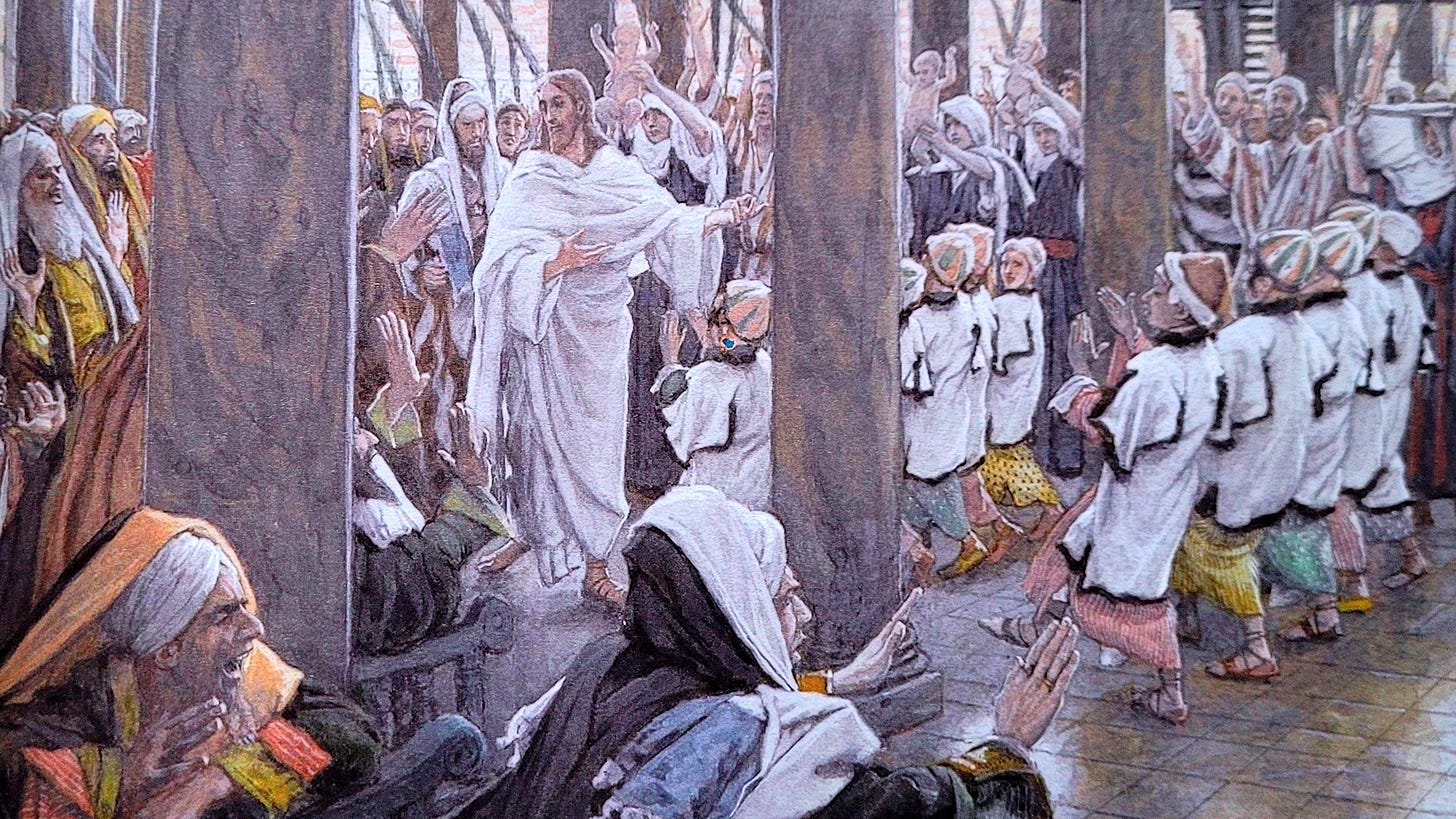How mere children shamed the Chief Priests in Holy Week
God delights in the praise of little ones, who have much to teach us about worship.

God delights in the praise of little ones, who have much to teach us about worship.
Editor’s Notes
In this Part, Fr. Coleridge tells us…
How the praises of children continued after Christ’s triumphal entry, while the Chief Priests remained cold and mute.
Why the simplest souls outshine the learned when grace and love abound.
That Christ rebuked his enemies for the vexatious complaints about the children.
There is so much material that we could share during Holy Week. Rather than trying to provide it all, we will instead focus on how and why Christ’s triumphal entry into Jerusalem provides a key to the whole of his blessed and glorious Passion.
The Procession of Palms
Passiontide, Part I, Chapter II
St. Matt. xxi. 14-17; St. Mark xi. 1-11; St. Luke xix. 29-44; St. John xii. 12-18.
Story of the Gospels, § 132
Burns and Oates, London, 1889
Headings and some line breaks added.
Sung on Palm Sunday
Our Lord casts reserve aside and enters Jerusalem as Christ the King
What was it about Palm Sunday that most surprised the Pharisees?
Healing the lame and blind
The shades of evening were already falling when He reached the city, for the procession of so many people, which seems to have traversed a space of about three miles in all, would take some time, and there was time also before it began for the news of His arrival at Bethany to reach the city, and for the crowds who met Him, as distinct from those who followed Him, to assemble and flock to the place where they heard He was.
There are, however, some incidents which we gather both from St. Matthew and St. John, which remain to be related before we close our account of the Day of Palms.
The first of these incidents is an act of mercy.
‘And there came to Him the blind and the lame in the Temple, and He healed them.’
For the Temple was a place to which the people thronged all day long for worship, especially at such times as the days before a great feast, and the duration of the feast itself, and at such times especially we might expect to find that the blind and the lame would be brought to the doors of the sacred enclosure to receive the alms of those who went in and out. This was the case with the blind men mentioned in the Gospels and Acts—the man born blind whom our Lord healed, and the lame man healed by St. Peter at the Beautiful gate of the Temple.
So when our Lord on this occasion had entered the Temple and looked all round, as if inspecting the house of His Father, it is natural that the little crowd of daily mendicants would gather round Him, and that He would in His great compassion heal them.
The Chief Priests
The Chief Priests would be there, cowed by the unusual and unexpected demonstration of the enthusiasm of the disciples that they had seen, and yet ever ready to find fault and put questions.
With them are mentioned also another set of worshippers, the children who had accompanied the procession. These children were never tired of repeating the joyful cries with which it had entered Jerusalem, even after they had ceased to be repeated by the greater part of the multitude, who do not seem to have accompanied our Lord into the Temple itself. All the more would the children shout, if they saw our Lord manifesting His power in favour of the lame and the blind.
This, then, quite accounts for what St. Matthew here says:
‘And the Chief Priests and the Scribes seeing the wonderful things that He did, and the children crying in the Temple and saying, Hosanna to the Son of David, were moved with indignation, and said to Him, Hearest Thou what these say?
‘And Jesus said to them, Yea, have you never read, Out of the mouth of infants and sucklings Thou hast perfected praise?
‘And leaving them He went out of the city unto Bethania, and remained there.’
It was always our Lord’s way to speak in defence of those who were blamed, especially if they were found fault with for anything that concerned the honour of God or for any service to Himself. He was thus in a manner bound to defend the children who were so importunate in rendering Him honour, at the time when the official representatives of the sacred nation and even the authorities of the sanctuary were silent, or cavillers at those who paid it to Him.
Thus we may suppose that at any time of His ministry He would have found a word to say in defence of the children who were blamed for praising Him.
But at the time which we have now reached, He had laid aside His usual reserve and silence in His own vindication and as to His own claims, and He was now acting in a royal way, rather defying and braving His enemies than paying any heed to their objections and remonstrances.
How did he do that?
And what is the hidden significance of Christ’s reference to Psalm 8, which the Chief Priests would surely understand?
Find out in the rest of this piece. The Father Coleridge Reader is a labour of love. But curating, cleaning up and publishing these texts takes a lot of time. Every now and then, we have to make one of the posts for members only, in order to keep it going.
Please consider joining us with a subscription!



